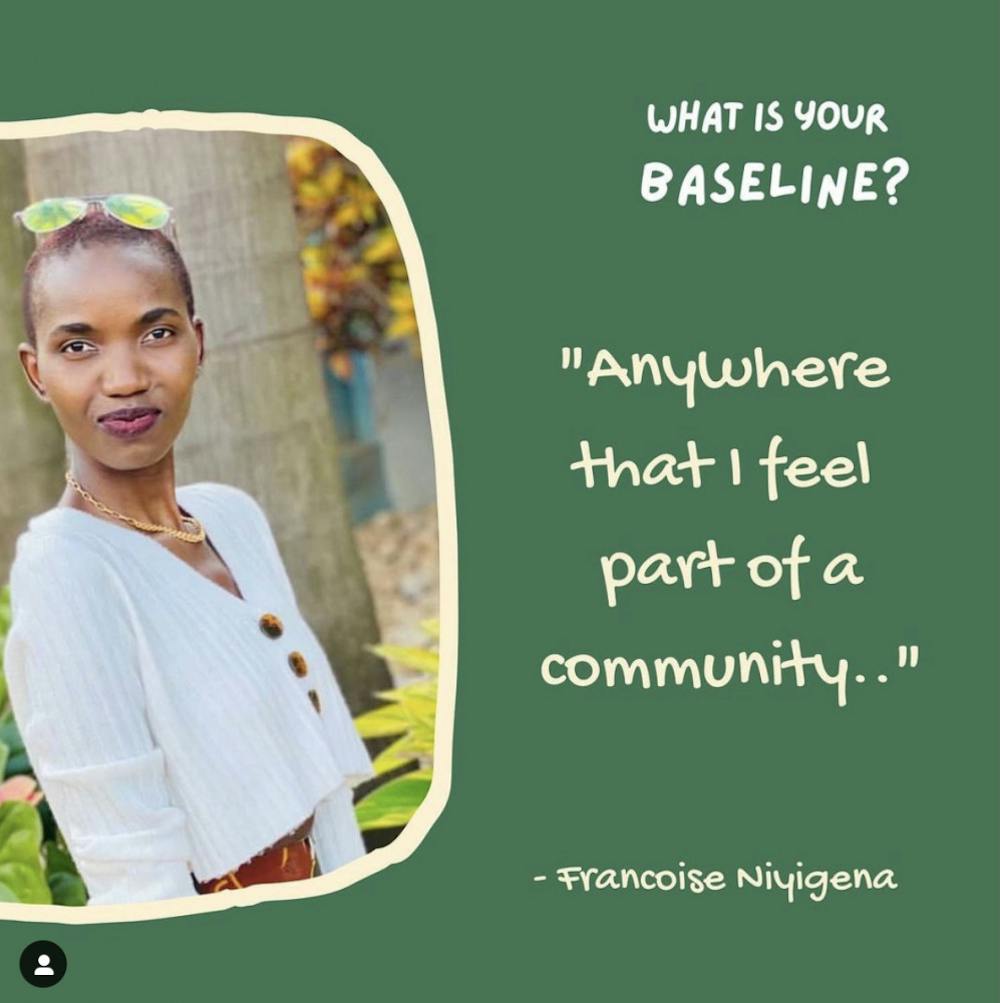Inspired by the theme “Back to Baseline,” TEDxMiddlebury hosted a conference featuring six speakers from the campus community on Thursday, April 29.
Each speaker came with their own interpretation of what it means to pull back and reflect, especially during a pandemic. The conference was split into two shows that were available via limited live seating or livestream.
 The lineup began with Francoise Niyigena ’21 who examined the impact of education globally and personally. Having grown up in a large family with her mother as the sole provider, Niyigena knew the value of education from a young age. For her, education extended beyond books; it meant opened doors and opportunity. Through scholarships and competitions (“for the money,” she slyly noted), Niyigena earned her way through school. Incredibly personal, with a galvanizing touch, her talk lauded the importance of educational equity.
The lineup began with Francoise Niyigena ’21 who examined the impact of education globally and personally. Having grown up in a large family with her mother as the sole provider, Niyigena knew the value of education from a young age. For her, education extended beyond books; it meant opened doors and opportunity. Through scholarships and competitions (“for the money,” she slyly noted), Niyigena earned her way through school. Incredibly personal, with a galvanizing touch, her talk lauded the importance of educational equity.
Next up, Frank Ji ’24 told his story of immigration to the U.S. and related his childhood stressors to those of the past few months. He discussed the effect of past stressors on his current loneliness and on recent experiences with familial tensions, death and a breakup. For Ji, finding himself in tough situations had been out of his control, but he still had the power of his choices. “I chose to stay and hold myself together, no matter how painful [a situation] was,” he said.
 Middlebury Director of Athletics Erin Quinn ’86 gave a heartfelt, vulnerable talk about moving through major life changes. Quinn discussed growing up as a child with anger issues and emotional vulnerability, noting the ways he is impacted by them today. Quinn referred to his problems as childhood-onset “energies,” complete with adult-onset “troubles,” pervasive throughout his shifts in career and responsibility. Quinn likened life challenges to swimming like a duck, struggling beneath the surface. Focusing on personal development for the crux of his speech, Quinn emphasized mindfulness in learning to trust in others, finding joy and developing a sense of empathy.
Middlebury Director of Athletics Erin Quinn ’86 gave a heartfelt, vulnerable talk about moving through major life changes. Quinn discussed growing up as a child with anger issues and emotional vulnerability, noting the ways he is impacted by them today. Quinn referred to his problems as childhood-onset “energies,” complete with adult-onset “troubles,” pervasive throughout his shifts in career and responsibility. Quinn likened life challenges to swimming like a duck, struggling beneath the surface. Focusing on personal development for the crux of his speech, Quinn emphasized mindfulness in learning to trust in others, finding joy and developing a sense of empathy.
Assistant Director of the Anderson Freeman Resource Center Janae Due spoke about fatness and its interactions with body positivity. Due identifies as a queer and disabled fat activist, and in her talk she highlighted the importance of not only recognizing divergent narratives in activism but the importance of liberation and prevalence of privilege. Her talk was packed with an informative synthesis of recent movements and subgroups in fat activism. Alongside a discussion of how she grew into her own body, Janae provided audiences with an exploration into how we learn to love ourselves.
Usman Ghani ’22 joked about his experimentation with the Middlebury Shooting Sports Club (MSSC) that came about because of a love for archery gone awry. As someone largely inexperienced with guns, Ghani discussed his accidental foray into a different side of shooting sports, connecting the experience to the modern political climate. Ghani’s talk felt relevant as he relayed conversations with close friends, both at Middlebury and back home in Brooklyn, about the way we organize and interpret symbols of violence or sport.
In the final TEDx talk, Omar Kawam explored the influence of faith and spirituality in the way we orient ourselves. As an Interfaith Fellow, Kawam works heavily in his daily life to recognize spiritual differences, seeking to bridge gaps in communication. Kawam noted the invariable divergences of worldview made possible through faith, and how they can make us feel either alienated or secure. Kawam talked about how it is important to recognize diverse practices and voices and provide a platform for understanding and accepting each other as well as possible. In a world with countless spiritual or theological leanings, Kawam pushed the audience to lean into moments of consternation, confusion and even disagreement as we learn to situate ourselves in the lives of others.
Each speaker came with a unique story and speech, from the questions raised by Kawam to the emotions highlighted by Ji. The theme of “Back to Baseline” prompted more than pure reflection; the speakers centered their talks in curiosity and growth.
TEDxMiddlebury brings its audience “back to baseline”

Comments



